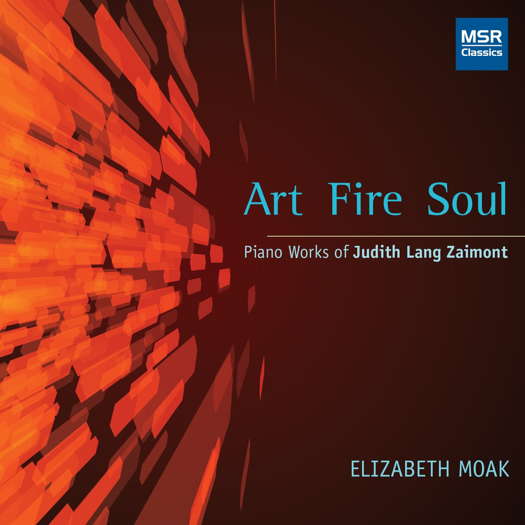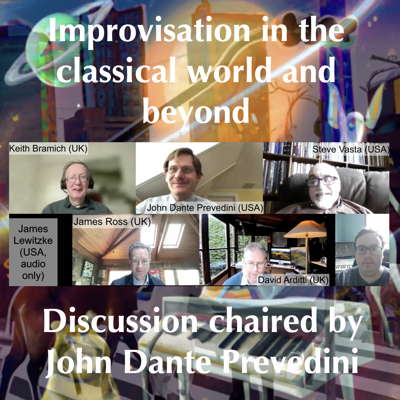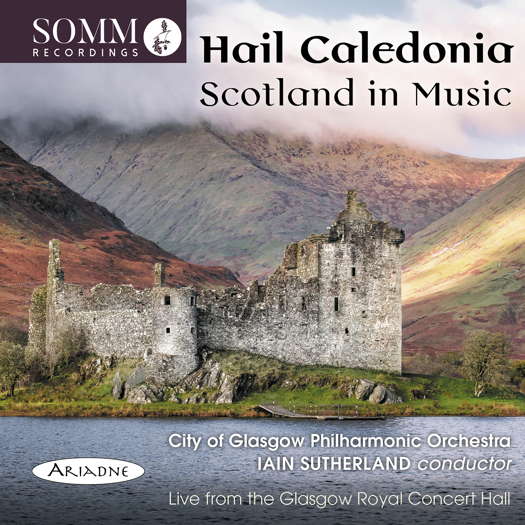- Matthew Washington Kennedy
- Judith Christin
- Eterio Stinfalico
- fantasies
- Marina Koshetz
- Pirkanmaa
- Elgar: There is sweet music
- Brandon Patrick George
 SPONSORED: CD Spotlight. An Encyclopedic Recital - Elizabeth Moak plays Judith Lang Zaimont, heard by the late Howard Smith.
SPONSORED: CD Spotlight. An Encyclopedic Recital - Elizabeth Moak plays Judith Lang Zaimont, heard by the late Howard Smith.
All sponsored features >>
 DISCUSSION: John Dante Prevedini leads a discussion about Improvisation in the classical world and beyond, including contributions from David Arditti, James Lewitzke, James Ross and Steve Vasta.
DISCUSSION: John Dante Prevedini leads a discussion about Improvisation in the classical world and beyond, including contributions from David Arditti, James Lewitzke, James Ross and Steve Vasta.

Vivacious Performances
Music from Scotland, heard by GERALD FENECH
'... a spectacular album full of inspirational melodies that go straight to the heart.'
Scotland is internationally known for its traditional music, which remained vibrant throughout the twentieth century and into the 21st, when many traditional forms worldwide lost popularity to pop music. In spite of emigration and a well-developed connection to music imported from the rest of Europe and the United States, the music of Scotland has kept many of its traditional aspects, and it has itself influenced many forms of music. Many outsiders associate Scottish music almost entirely with the Great Highland Bagpipe, which has long played an important part in Scottish music. The earliest mention of bagpipes in Scotland dates from the fifteenth century, although they are believed to have been introduced to Britain by the Roman armies. The Great Highland Bagpipe was originally associated with both hereditary piping families and professional pipers to various clan chiefs. Later pipes were adopted for use in other venues, including military marching. But this distinct tradition was limited to the impact of the Scottish Reformation which also had a negative effect on music of the previous two centuries, particularly ecclesiastical music. But as the eighteenth century made its bow, things started to change.
In the 1720s the Italian cellist and composer Lorenzo Bocchi introduced in Scotland the Italian style of classical music. Indeed, several Italian musicians were active in the capital in this period, and there are several known Scottish composers who wrote in the classical style, including Thomas Erskine, the first Scot known to have produced a symphony. In 1728, the Musical Society of Edinburgh was incorporated. From the mid-nineteenth century, classical music began a revival in Scotland, aided by the visits of Chopin and Mendelssohn in the 1840s. By the late nineteenth century, there was in effect a national school of orchestral and operatic music in Scotland, with major composers such as Alexander MacKenzie, William Wallace and Hamish MacCunn all coming to the fore. After World War I, Erik Chisholm founded the Scottish Ballet Society and helped create several ballets. In 1974 the Edinburgh Festival was founded and this led to an expansion of classical music in Scotland. Indeed, in 1960 the Scottish Opera was founded, not to mention the setting up of new orchestras and inauguration of several concert halls.
This exciting CD focuses on all that is best in music in Scotland, past and present. Recorded live in Glasgow's Royal Concert Hall in 1995-96 and newly remastered, these vivacious performances feature the City of Glasgow Pipe Band and Chorus and the City's Philharmonic Orchestra, conducted by homeland personality Iain Sutherland, who provides brilliant orchestral arrangements of The Black Bear Salute, reputedly the British army's fastest regimental march, and the evergreen Amazing Grace, together with his own colourful Three Scottish Castles Suite.
Listen — Iain Sutherland: Edinburgh Castle, Princes Street
(Three Scottish Castles Suite)
(track 11, 0:00-0:55) ℗ 2021 SOMM Recordings :
Roy Williamson's anthem Flower of Scotland is heard alongside Robert Docker's Abbey's Craig, better known as Scots Wha Hae, and Granville Bantock's exquisite treatment of a traditional Scottish waulking song, Kishmul's Galley.
Listen — arranged by Granville Bantock: Kishmul's Galley
(track 13, 0:00-0:55) ℗ 2021 SOMM Recordings :
Also featured is Mendelssohn's Scherzo from the 3rd Symphony 'The Scottish' and Malcolm Arnold's wonderfully realised Four Scottish Dances.
Listen — Malcolm Arnold: Hebrides (Four Scottish Dances)
(track 16, 2:47-3:44) ℗ 2021 SOMM Recordings :
Music by Eric Coates: Elizabeth of Glamis (Springtime in Angus), Alexander MacKenzie: Benedictus, Op 37 No 3 and Ernest Tomlinson: Cumberland Square are also included.
Two theme tunes from a couple of hugely popular Scottish television dramas, Hamish MacCunn's Land of the Mountain and the Flood from Sutherland's Law and Arthur Blake's Take the High Road are also part of this programme which ends with the infectious 'Devil's Finale/Reel of Tulloch' from Ian Whyte's ballet Donald of the Burthens.
Listen — Ian Whyte: Devil's Finale/Reel of Tulloch (Donald of the Burthens)
(track 20, 5:13-6:05) ℗ 2021 SOMM Recordings :
This is a spectacular album full of inspirational melodies that go straight to the heart. Extra plusses are the very generous playing time - nearly eighty minutes - and the superb annotations by Robert Matthew-Walker. Recommended.
Copyright © 18 January 2022
Gerald Fenech,
Gzira, Malta

CD INFORMATION: HAIL CALEDONIA - SCOTLAND IN MUSIC
CLASSICAL MUSIC ARTICLES ABOUT SCOTLAND


